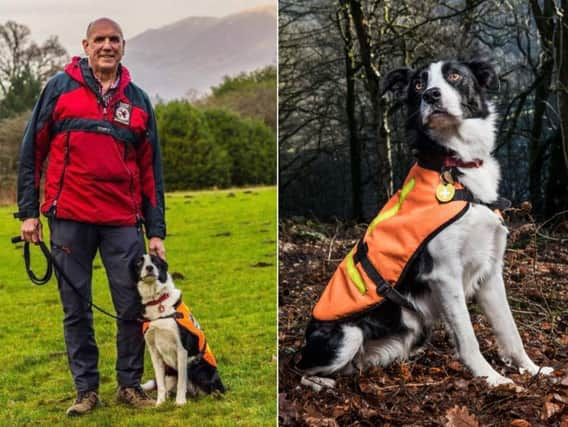Calder Valley rescue dog Wynn makes the grade to save people's lives


The success confirms they have achieved the required standard to carry out operational duties.
Wynn joined the team in 2015 as a 10 week old trainee.
She is the third puppy that David has trained up as a mountain rescue search dog in a process which has taken two and a half years.
Advertisement
Hide AdAdvertisement
Hide AdThe MRSDE Assessment required the pair to demonstrate their capability over three days in winter conditions in the Lake District mountains, searching for “missing” volunteers (dogsbodies), during which they undertook five searches, successfully achieving five passes.
In addition to being capable of operating in mountain and high moorland environments in all weather conditions, they are also trained in searching in lowland areas, including woodland, semi-rural areas and certain urban environments.
Search dog Wynn now joins Meg, Jack and Finn serving CVSRT across the operational area and mid-Pennines region, and beyond if required.
A spokesman said: “Search dogs have been a part of CVSRT since 1977 and we now have a team of four air-scenting search dogs and handlers with three trainee search dogs (Tinker, Orion and Tess).
Advertisement
Hide AdAdvertisement
Hide Ad“Over the years there have been 17 qualified search dogs and 11 handlers assisting the search team.
“The dogs are trained to ‘air scent’ so, as a general rule, they do not track the missing person, but react to wind borne human scent.
“A search dog can cover large areas of ground, including difficult terrain and woodland in the search and is very sensitive to any human scent it finds.
“It will immediately follow a scent to its source.
“It will then ‘indicate’ to its handler, usually by barking, to let them know it’s made a find. It is not unusual for a dog to pick up a scent from a missing person 500 metres away.
Advertisement
Hide AdAdvertisement
Hide Ad“As part of the training process, dogsbodies are used to hone the dog’s senses.
“Dogsbodies are highly valued volunteers from the community who assist in the development of the search dog. They go out on the hill and hide for the dogs to find on training and assessments courses.
“If you would like to know more about the CVSRT search dogs or think you could volunteer to be a dogsbody to assist with training, visit www.cvsrt.org.uk/the-team/cvsrt-search-dogs.”